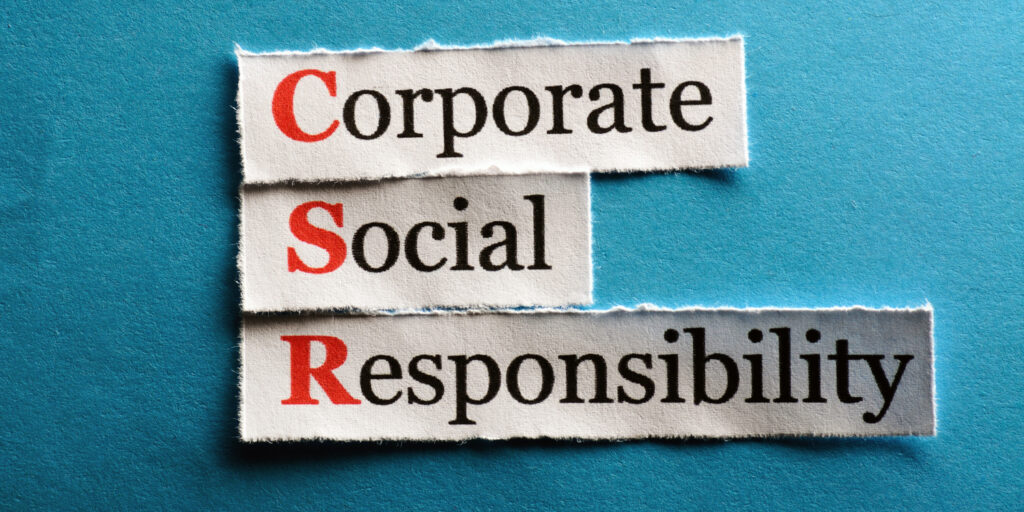Corporate social responsibility (CSR) has become an increasingly prominent part of the agenda for businesses of all sizes over recent years. Many companies now have a CSR policy and incorporate their principles of social responsibility as a core part of their marketing materials.
Corporate social responsibility: the basics
Corporate social responsibility refers to the approach of a company towards various social and ethical issues which are often not directly addressed by legislation. It covers a range of matters, including environment and use of energy; health and well-being of employees; diversity within the workforce; stance on ethics and human rights in the wider supply chain; and education and charitable work.
Let’s consider these areas in more detail.
Environment and energy
Every trading company will have some degree of impact on the environment. Whether it’s an industrial business that has to manage substantial pollution output, or an office-based enterprise with low heating and electrical needs, reducing energy consumption and minimising waste is a key part of corporate social responsibility.
Health and well-being of employees
All companies have a legal duty to protect the health of their employees in the workplace, which includes reducing their exposure to stress and avoiding mental health issues from being exacerbated as a result of the nature of the work. But many businesses go beyond their legal obligations, providing free access to counselling and even private healthcare.
Encouraging physical exercise by offering cycle to work schemes or gym membership can also help to promote health.
Diversity and equality
Any business with employees or workers must take care to ensure there is no workplace discrimination under the Equality Act 2010. This means treating everyone equally, irrespective of age, sex, race, disability, and all of the other protected characteristics.
Many companies will seek to go a step further by promoting diversity amongst their staff and decision-makers, such as cultivating a balance of men and women on the board, but care needs to be taken not to engage in “positive discrimination” as this can also be deemed illegal under the Equality Act.
Ethics and human rights
As well as building an ethical corporate ethos amongst its own staff, in order to be truly socially responsible, it’s important for a company to consider the wider supply chain.
Clients and suppliers should be audited to check that their business practices are in line with the ethical stance promoted by the company. This is particularly important in the case of international supply chains where the rights of employees – and even human rights in general – can differ drastically between jurisdictions.
Education and charity work
Some companies provide educational opportunities, both for their own staff and in terms of taking on apprentices and working with educational establishments.
Other businesses encourage charitable work, either by sponsoring events or allowing employees to take paid leave to volunteer for charitable causes. This can all help to cultivate corporate social responsibility.
Why is corporate social responsibility important for my business?
Ethics within business are important in their own right, and considering the effects of trading upon the environment and society is part and parcel of running a socially responsible company.
But there are also tangible business benefits of engendering a socially responsible ethos within a company. Notably, creating an ethical business can help to also build a brand, attracting customers based on principles of fairness and decency. Companies such as The Body Shop and John Lewis have gained large numbers of loyal customers, partly as a result of their commitment to sourcing ethical products and treating their workforce fairly.
- Company policies every business should have
- Ways to promote your business
- 5 tips to manage health and safety at work
Nowadays, the “International Fairtrade Certification Mark” is a core element of many famous brands – especially those selling food products such as coffee and chocolate.
Aside from winning custom, the ethical reputation of a business can help to attract new members of staff. Younger recruits are increasingly discerning when it comes to choosing an employer, and will often opt to place business ethics above a larger pay packet. Google’s original “Don’t be evil” motto likely persuaded many highly in-demand Silicon Valley computer engineers to choose the search engine above other tech employers.
Should my company have a CSR policy?
Having a written CSR policy can be useful, both in terms of providing clear guidance to management and staff and as a document that can be incorporated in any relevant marketing materials for PR purposes.
But it’s important to actually make any necessary changes within the company before implementing a CSR policy, in order to “walk the walk as well as talk the talk”. Simply publishing a template policy on corporate social responsibility, without taking steps to achieve the aims, can lead to accusations of hypocrisy being levelled against the business. Every CSR policy should therefore be tailored to match the ethos of the company.
The CSR policy should also be periodically reviewed and updated if necessary. Public attitudes to notions of social responsibility can change drastically over time, and ethical values contained in a policy should ideally reflect modern thinking to avoid alienating large segments of the customer base.
Mandatory reporting and disclosures
Aside from the regular employment laws, there are certain legal responsibilities for companies with regard to corporate social responsibility issues.
Under the Equality Act 2010 (Gender Pay Gap Information) Regulations 2017, all companies with at least 250 employees are required to publish their gender pay gap data every year. The data specifically includes the:
- mean gender pay gap in hourly pay
- median gender pay gap in hourly pay
- mean bonus gender pay gap
- median bonus gender pay gap
- proportion of males and females receiving a bonus payment
- proportion of males and females in each pay quartile
More information on gender pay gap reporting is available at GOV.UK.
Meanwhile, the draft Companies (Strategic Report) (Climate-related Financial Disclosure) Regulations 2021 will make it compulsory, from April 2022, for some of the UK’s largest companies to disclose climate-related financial information. To find out more about this forthcoming legislation, see GOV.UK.
It should be noted that, although these mandatory reporting regimes currently only affect larger companies, the direction of travel means that SMEs may well be covered by similar requirements in the future.
Please note that the information provided in this article is for general informational purposes only and does not constitute legal, tax, or professional advice. While our aim is that the content is accurate and up to date, it should not be relied upon as a substitute for tailored advice from qualified professionals. We strongly recommend that you seek independent legal and tax advice specific to your circumstances before acting on any information contained in this article. We accept no responsibility or liability for any loss or damage that may result from your reliance on the information provided in this article. Use of the information contained in this article is entirely at your own risk.








Join The Discussion